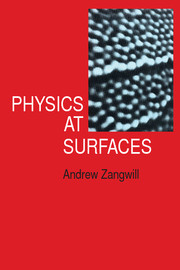5 - Phase transitions
Published online by Cambridge University Press: 05 August 2012
Summary
Introduction
The study of phase transitions plays a central role in modern condensed matter physics. Changes of phase often are very dramatic events and certainly one wants a good understanding of such transformations. However, the stature of this field derives mostly from the recognition that the fundamental concepts, language and methodology developed to attack the phase transition problem have far-reaching utility in other areas of physics. In this chapter, we take advantage of the successes in this branch of statistical physics as a part of a two-pronged program. On the one hand, we apply the phenomenological methods of the modern theory (which focus on notions such as symmetry and order) to highlight those aspects of surface phase transitions that do not depend on the details of the system. On the other hand, a few specific examples are examined in more depth to illustrate that an appreciation of these details can significantly deepen our understanding of surface processes. We begin with a brief review.
Phase transitions occur because all systems in thermodynamic equilibrium seek to minimize their free energy, F = U − TS. One phase will supplant another at a given temperature because different states (e.g., liquid/vapor, magnetic/non-magnetic, cubic/tetragonal) partition their free energy between the internal energy U(T) and the entropy S(T) in different ways. It is useful to characterize competing phases in terms of a so-called order parameter.
- Type
- Chapter
- Information
- Physics at Surfaces , pp. 110 - 137Publisher: Cambridge University PressPrint publication year: 1988



